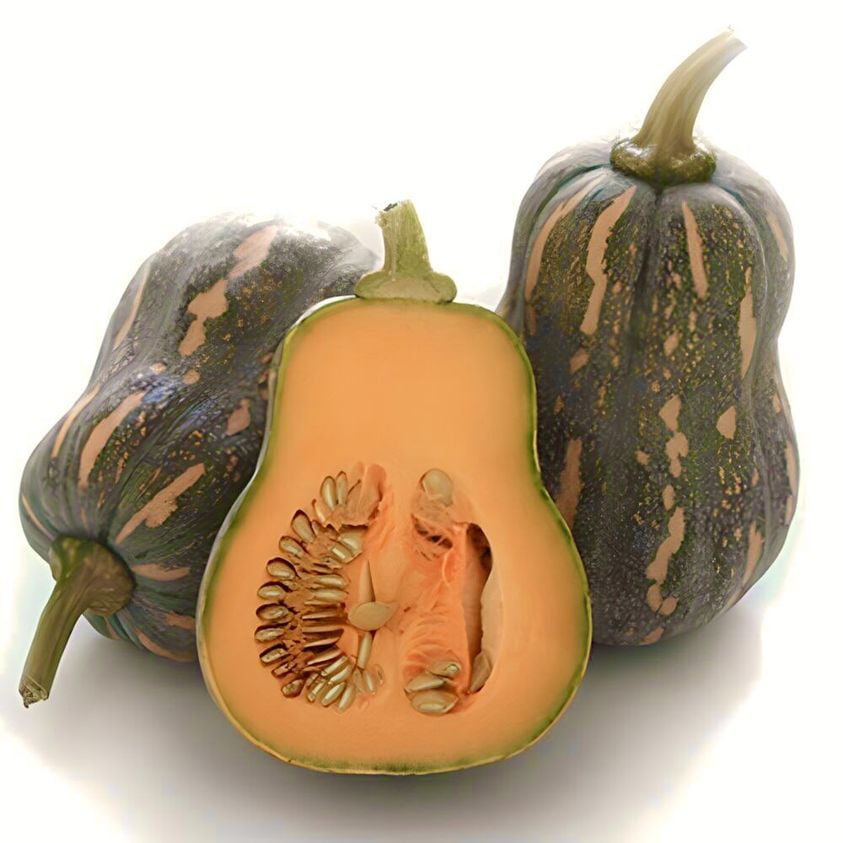
Pumpkin is a healthy food - Illustration photo
Vitamin A is the best medicine for many diseases.
Dr. Truong Quang Hai from Hanoi Medical University stated that pumpkin is a familiar food enjoyed by many, not only because it is easy to eat and prepare, but also because it provides many valuable nutrients and vitamins.
100g of cooked pumpkin contains: 9mg phosphorus, 430mg potassium, 23mg calcium, 17mg magnesium, 0.5mg iron, 8mg vitamin C (15% of the daily requirement), 22mcg folacin (11% of the daily requirement), 1mg beta-carotene...
The nutritional composition of pumpkin is typically 90% water, 8% carbohydrates, and 1% protein. Its vitamin A content is among the highest of all vegetables. Furthermore, the vitamins in pumpkin are valuable for treating many ailments.
According to physician Nguyen Huu Toan - Hai Phong Oriental Medicine Association, in terms of pharmacology, pumpkin has antioxidant effects, strengthens the immune system, and prevents cancer. In Oriental medicine, pumpkin is a precious medicine, sweet in taste, warm in nature, with the following uses: clearing heat, quenching thirst, generating body fluids..., often treating headaches, dizziness, poor eyesight, hepatitis, weak kidneys...
- Headache, dizziness, insomnia : Eat stewed pumpkin, peanuts, and lotus seeds.
- Diabetes : Pumpkin is rich in cobalt. This substance can activate the body's metabolism, promote blood-forming function, and participate in the synthesis of vitamin B12.
In addition, this is also a trace element necessary for human pancreatic islet cells, has a special effect in preventing diabetes and lowering blood sugar. How to prepare: 200g pumpkin, 100g green beans, 100g pork bones, stew until soft, add spices to taste.
- Lowering blood lipids and preventing stroke : Polysaccharides and omega-3 and omega-6 fatty acids in pumpkin may have similar effects to phospholipids, which can remove cholesterol and prevent atherosclerosis, preventing and treating hypertension and other cardiovascular diseases.
Pumpkin can help prevent strokes because it contains many glyceric acids such as linoleic acid, palmitic acid, and stearic acid, all of which are beneficial oils.
- Detoxification : Pumpkin contains vitamins and pectin. Pectin has good adsorption properties, capable of binding to and removing bacterial toxins and other harmful substances in the body such as lead, mercury, and radioactive elements in heavy metals.
- Liver protection : Pumpkin powder is very good in treating hepatitis and cirrhosis. Yellow-green vegetables such as pumpkin can help destroy ingredients in pesticides, nitrites and other toxic substances in other foods, enhancing the regeneration of liver and kidney cells.
- Deworming : Traditional medicine has used pumpkin seeds to treat intestinal worms. Consume about 50g of roasted pumpkin seeds (including the shells) in the early morning. Fasting is optional, but it's better to do so. Taking a laxative an hour later is recommended. Repeat this several times until all parasite eggs are completely eliminated.
- Brain development: Pumpkin contains a lot of glutamine acid, a substance essential for brain function. This substance plays an important role in assisting metabolic reactions in nerve and brain cells, nourishing the brain.
- Weight loss : Pumpkin is a high-fiber food with low calorie and fat content, making it an ideal food for people who want to lose weight or are obese.
- Boosts the immune system : Pumpkin is rich in vitamin C, which helps strengthen the body's resistance and makes the immune system healthier. With a healthy immune system, our bodies can fight off harmful bacteria and viruses.
- Good for fetal development: The substances in pumpkin seeds and flowers help the fetus develop brain cells, enhance fetal vitality, and help prevent edema, high blood pressure, other complications during pregnancy, and protect against postpartum dengue fever.
- Cancer prevention: Yellow foods like pumpkin, carrots, and sweet potatoes contain many antioxidants and beta-carotene, which can help prevent various types of cancer.
- Good for bones: Pumpkin also contains a large amount of minerals and calcium, sodium, and potassium. These substances are especially beneficial for the elderly and those with high blood pressure, helping to prevent osteoporosis and high blood pressure. In addition, it contains magnesium, phosphorus, iron, copper, manganese, chromium, and many other elements that aid bone development.
- Antidepressant : Pumpkin is rich in L-tryptophan, a substance that helps increase feelings of happiness. We tend to feel depressed when L-tryptophan levels in the body are low. Pumpkin juice helps increase L-tryptophan levels, making us feel relaxed and happy.
- Prevents peptic ulcers: Pumpkin juice helps the intestines digest food quickly and helps remove toxins from the digestive tract. Therefore, pumpkin juice can heal peptic ulcers and other intestinal infections.
- Good for the respiratory system: The antioxidants and pain-relieving substances in pumpkin juice help prevent allergic asthma and gradually reduce the severity of the disease.
- Good for the eyes: Pumpkin is rich in vitamin E and beta-carotene. Vitamin E has strong antioxidant properties, effectively protecting the body from certain free radicals and the harmful effects of peroxides. Beta-carotene is a type of carotenoid that metabolizes vitamin A in the body, helping to protect eyesight and prevent eye diseases.
- Helps beautify the skin : The water content in pumpkin is quite high, so it will help women protect their skin and fight against the harmful effects of sunlight.
Not only used in dishes, you can use pumpkin to make skin care masks.
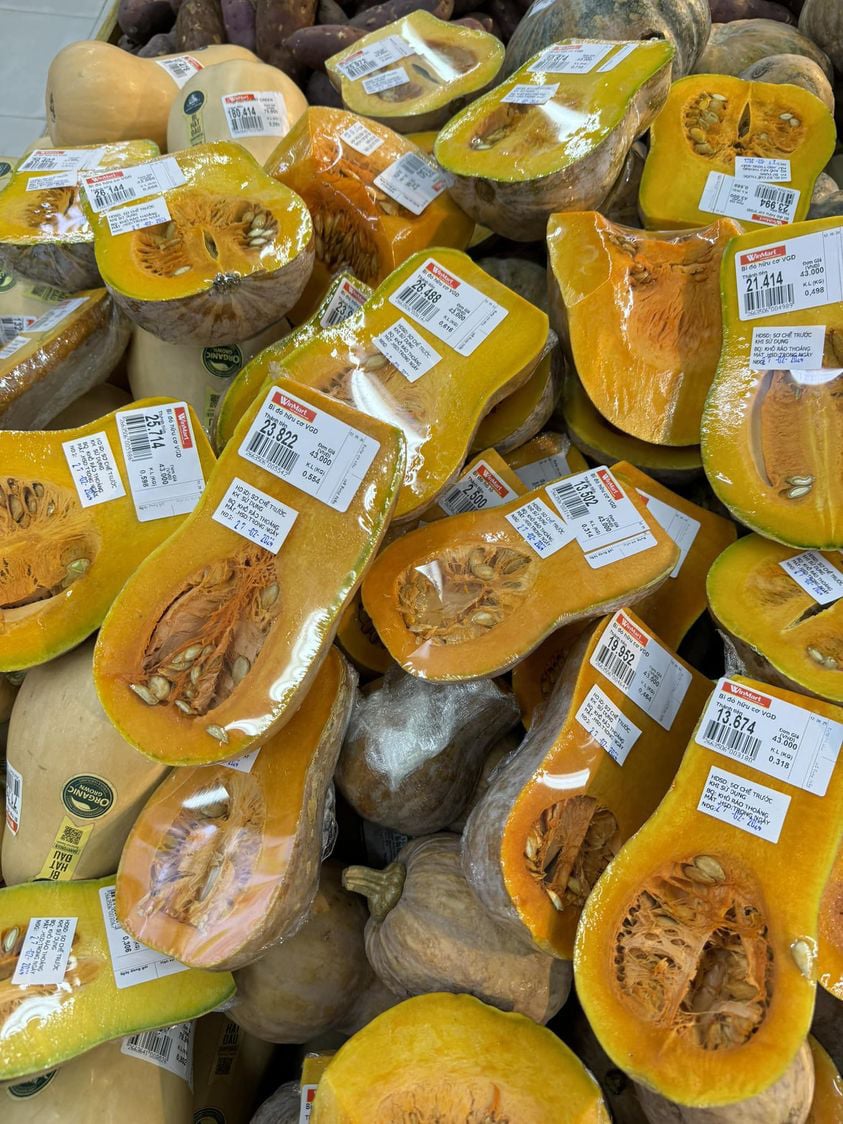
Pumpkin needs to be processed and preserved properly.
Eating wrong will be harmful
Pumpkin is very good for health but you need to be careful to avoid mistakes when using it that can cause more illness.
Eating pumpkin continuously: According to nutritionists, you should not eat pumpkin more than 2 meals/week. The reason is that pumpkin contains a lot of vitamin A precursors. If you eat a lot, this substance will not be digested in time and will be stored in the liver and under the skin. This will cause the tip of the nose, palms of the hands and soles of the feet to easily turn yellow.
Old pumpkins that are stored for too long are prone to fermentation : Pumpkins contain a high amount of sugar, and furthermore, if stored for a long time, anaerobic respiration – fermentation and spoilage – can easily occur inside the pumpkin, making them dangerous to health when consumed.
Eating when you have digestive disorders : People with digestive disorders should limit their consumption of pumpkin because its high fiber content is not good for their condition.
Refrigeration storage: Do not store cooked pumpkin in the refrigerator, and absolutely do not freeze it, as freezing will cause it to turn yellowish-brown, making it unsafe to eat.
Cooking pumpkin with oil: Avoid cooking pumpkin with oil because using oil to fry or sauté it reduces its nutrients. Therefore, prepare it by boiling, baking, or steaming.
Source








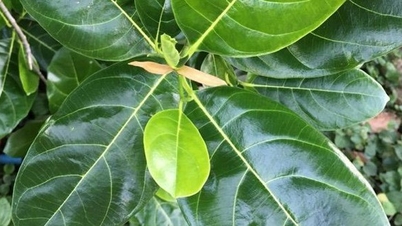


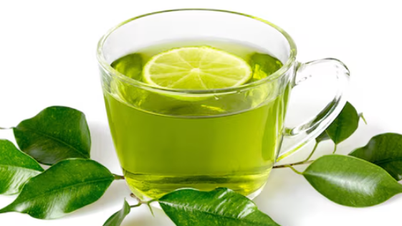









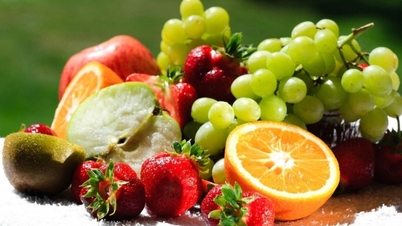









































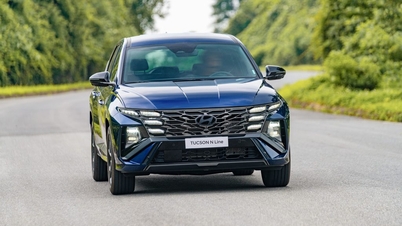















































Comment (0)